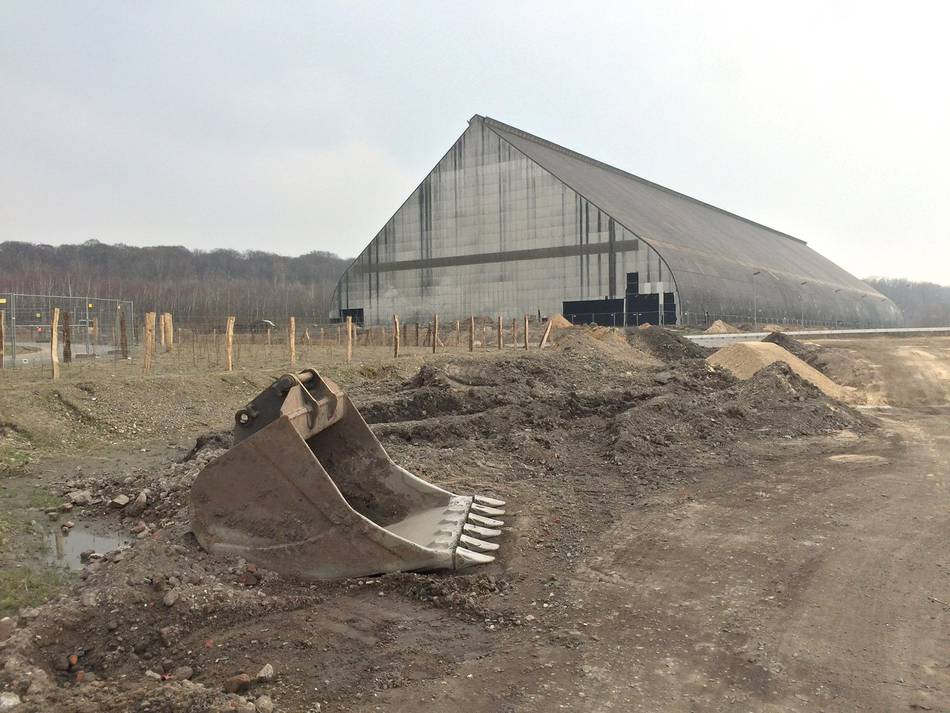Accattone
Opening of the Ruhrtriennale 2015

The Dutch general theatre director Johan Simons commenced his three-year term as artistic director of the Ruhrtriennale in 2015 with a production that he himself has directed. With the world premiere of the piece “Accattone“ based on the film of the same name by Pier Paoli Pasolini in a musical adaptation by the Bach specialist Philippe Herreweghe, general theatre director and stage director Simons wished to emphasise his theme “Be Embraced” at the start of his term. Simons aims to attract larger audiences from all social classes and walks of life to the Ruhrtriennale.
The performance of “Accattone” took place beneath the monumental barrel-vault ceiling of the Lohberg coal-mixing factory in Dinslaken. The building is located in the immediate vicinity of a former mining settlement, which municipal authorities plan to convert into a modern, ecological city quarter. The premiere of “Accattone” was the first time the coal mixing hall at the Lohberg colliery is used as a venue for the Ruhrtriennale.
The Ruhrtriennale’s opening performance in 2015 marked the continuation of its future-oriented, cultural-political tradition of staging outstanding works of contemporary music and art in vacated mining facilities in a region characterised by de-industrialisation and social disparities. This practice consciously draws public attention to these facilities, thereby encouraging public discourse on the opportunities for future development in the region.
Pasolini’s first film “Accattone” highlights the precarious state of Rome’s sub-proletariat, a class of people banished to the city’s outskirts who must fight for survival every day with no prospect of education or personal advancement. The perspective of this social class is expressed through the protagonist’s personal Passion; Accattone drinks, steals, lies and forces his girlfriend into prostitution. Pasolini situates his protagonist in a social reality which resembles Dante’s Inferno. As a type of anti-Messiah, his character represents the negative side of middle-class values and morals – a reflection of rampant capitalism, in which identity is exclusively derived from work and function, and all dysfunctional elements of society are brushed to the wayside.
Johan Simons’ production focused on this point – the point when a principle, which raises work to paramount importance in a capitalistic value system, is replaced by personal rebellion. In contrast to Pasolini’s pessimistic recognition of the equalising power of capitalism, Simons emphasises Accattone’s struggle and his refusal to acknowledge that work is an identity-building force. Accattone assails the middle-class value system using his own language, the language of the street, and his aversion to the necessity of productivity. Today’s Accattone is a heretic through and through. He challenges every order, be it middle-class, economic, governmental or religious. As an anarchic anti-Messiah, he turns the transcending power of the “industrial cathedrals” into their materialistic opposite – material without spirit, the present without future. Instead of a promise of heavenly redemption, he offers affirmation of the worldly in the here and now.
In selecting music for the production, Herreweghe and Simons not only chose arias and choral works from Bach’s St. Matthew Passion and St. John Passion, but also many of his most popular cantatas, such as “Ich hatte viel Bekümmernis”, “Ich habe genug” and “Weinen, Klagen, Sorgen, Zagen”. It is Bach’s music which transforms the barrel vault of the coal-mixing factory in Dinslaken into a holy shrine, an industrial cathedral, where the tension between heaven and earth inherent in Bach’s music finds a suitable venue.
The Ruhrtriennale’s production of “Accattone” was made possible in cooperation with the Munich Kammerspiele, and artists from the renowned Belgian municipal theatre NTGent and the Collegium Vocale Gent.
All performance dates
August 14th,15th,19th,20th,22nd and 23rd 2015, 20 p.m.
Contact
Ruhrtriennale
Kultur Ruhr GmbH
Leithestraße 35
45886 Gelsenkirchen
